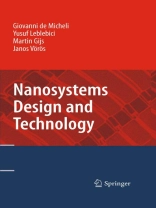Nanosystems use new, nanoscopic electrical and/or mechanical devices which, as constituents of electronic and electromechanical systems, find application primarily in computing, embedded control and biomedical data acquisition. In particular, this book will deal with the characterization and patterning of these materials from an engineering perspective, with the objective of creating operational prototypes and products.
The book will integrate various nano technologies on materials, devices and systems and identify key areas and results. The book will describe different design aspects for integrated systems on silicon, as well as on heterogeneous platforms including, but not limited to, electrical, optical, micromechanical and biological components in various forms and mixtures. By associating research topics from differing horizons, the book will provide a unique opportunity to bridge the gap between electronics/electrical engineering and materials science. The book will include topics at the intersection of these disciplines, and will interface with computer science, biology and medicine.
表中的内容
Nanosystems.- Materials and Devices for Nanoelectronic Systems Beyond Ultimately Scaled CMOS.- Design Technologies for Nanoelectronic Systems Beyond Ultimately Scaled CMOS.- Actuation and Detection of Magnetic Microparticles in a Bioanalytical Microsystem with Integrated CMOS Chip.- Thin Film Bulk Acoustic Wave Resonators for Gravimetric Sensing.- Lab-on-a-chip for Analysis and Diagnostics: Application to Multiplexed Detection of Antibiotics in Milk.- Nanowire Development and Characterization for Applications in Biosensing.
关于作者
Giovanni De Micheli (Ph.D. U.C.Berkely 1983) is Professor and Director of the Institute of Electrical Engineering at Ecole Polytechnique Fédérale de Lausanne (EPFL), Lausanne, Switzerland and President of the Scientific Committee of CSEM, Neuchâtel, Switzerland. Previously, he was Professor of Electrical Engineering at Stanford University. His research interests include several aspects of design technologies for integrated circuits and systems, such as synthesis, hw/sw codesign and low-power design, as well as systems on heterogeneous platforms including electrical, micromechanical and biological components. Prof. De Micheli is the recipient of the 2003 IEEE Emanuel Piore Award for contributions to computer-aided synthesis of digital systems. He is a Fellow of ACM and IEEE.
Yusuf Leblebici (Ph.D. U.I.Urbana Champaign 1990) is Professor of Electrical Engineering at EPFL, Lausanne, Switzerland From 1991 to 1993 he worked as Visiting Assistant Professor of Electrical and Computer Engineering at the University of Illinois at Urbana-Champaign. From 1993 to 1998, he was on the faculty of Istanbul Technical University as Associate Professor of Electrical Engineering. He also worked as a senior designer and project manager at ETA ASIC Design Center, Istanbul. From September 1996 to March 1998, he was an Invited Professor in the Department of Electrical Engineering, at the Swiss Federal Institute of Technology in Lausanne (EPFL).
Martin A.M. Gijs (Ph.D. K.U. Leuven 1986) joined the Philips Research Laboratories in Eindhoven, The Netherlands, in 1987, where he worked on micro-and nano-fabrication processes of superconducting Josephson and tunnel junctions, the microfabrication of microstructures in magnetic multilayers showing the giant magnetoresistance effect, the design and realisation of miniaturised motors for hard disk applications and the design and realisation of planar transformers for miniaturised power applications. He joined EPFL in1997 as Professor of Micro Techniques. His present interests are in developing technologies for novel magnetic devices, new microfabrication technologies for microsystems fabrication in general and the development and use of microsystems technologies for microfluidic and biomedical applications in particular.
János Vörös (Ph.D. XXX) is an Associate Professor in the Institute for Biomedical Engineering of the University and ETH Zurich heading the Laboratory for Biosensors and Bioelectronics. Prof. Vörös is interested in research and teaching in the areas of Bioelectronics, Nano-Biotechnology, Biosensors, Biophysics, and Biomaterials with special focus on the understanding, monitoring and controlling of molecular and cellular processes at biological interfaces. His research group focuses on the development of novel biosensor techniques for diagnostics and drug discovery; on using nanobiotechnology for interfacing neural networks; as well as on controlling and understanding the behavior of biomolecules and cells in the presence of electrical fields and currents.












